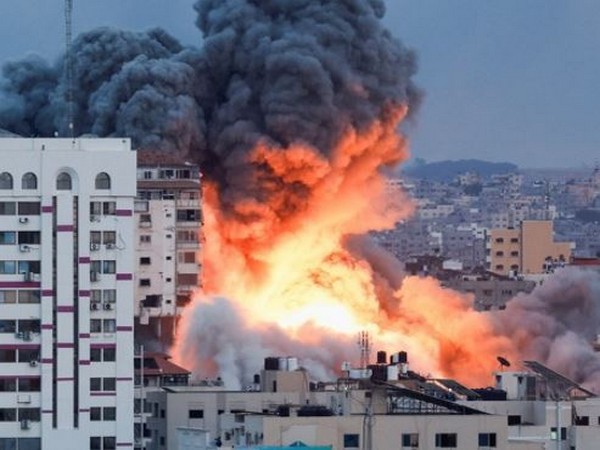
1 year of Middle East fire and bullets
Oct 07, 2024
Tel Aviv [Israel], October 7: One year after Hamas (Palestine) forces suddenly attacked Israel on October 7, 2023, the conflict in the Middle East has not yet erupted into a full-scale war, but has continued to escalate and cause much instability not only in this region.
Breaking many limits
In less than 6 months, Iran has directly attacked Israeli territory twice (on the night of April 13 and the night of October 1). This is unprecedented, despite the fact that the two sides have had many tensions and Israel has fought fiercely with pro-Iranian forces for many years.
Iran's launch of missiles and unmanned aerial vehicles (UAVs) against Israel on the night of April 13 and early morning of April 14 showed that the regional war is involving many countries. In the attack, through the dense network that the US has established, this country and its allies actively supported Israel to intercept Iranian missiles and UAVs.
Specifically, the Terminal High Altitude Area Defense (THAAD) and Patriot long-range missile defense systems have been deployed in Iraq, Kuwait, the UAE, Qatar, Saudi Arabia, Jordan and at the secret base coded 512 that the US placed in Israel. US warships in the region, the above missile defense network and US fighter jets stationed in Kuwait, Jordan, the UAE, Qatar and Saudi Arabia coordinate to form a defensive dome covering Israel (and the US's own regional bases with other countries). The UK is also closely linked to this network, or Bahrain has purchased Patriot missiles to become part of the network. Therefore, if we add the parties directly involved such as Iran, Hezbollah (Lebanon), Houthi (Yemen), gunmen in Syria, Hamas (Palestine), then Israel's conflict in the Middle East is being involved by no less than 15 countries.
Not only that, just one year of conflict has caused both Hezbollah and Hamas to suffer unprecedented losses in leadership. Not only have many senior commanders been killed, but Mr. Ismail Haniyeh, the highest political leader of Hamas, was also killed in Iran while visiting the country. Tel Aviv is believed to be behind Mr. Haniyeh's death. Similarly, almost the entire top leadership of Hezbollah has also been killed. In just two months, deputy general Fuad Shukr and then supreme leader Hassan Nasrallah were killed in Israeli raids.
After advancing into the Gaza Strip, Israel also advanced into Lebanon for the first time since the 2006 war. The situation in the region shows no signs of abating.
Prolonged deadlock
Meanwhile, the humanitarian crisis in the Gaza Strip is becoming increasingly severe. Since the outbreak of hostilities, attacks and conflicts in Gaza have killed nearly 42,000 people and displaced nearly 2.3 million Gazans. Many humanitarian activities have been carried out but are not enough to solve the problem.
The humanitarian crisis in Gaza has drawn criticism from Israel and made it increasingly difficult for Washington to support its ally Tel Aviv.
Expert Mark C. Schwartz (RAND Corporation, USA) assessed: "The US administration has shifted from clear support for Israel to real disappointment and frustration with the way Israel is conducting the war in Gaza".
Similarly, Professor Michelle Grise (also from RAND) assessed: "Over the past year, the US has sought to balance providing support to Israel - in the form of military aid and intelligence sharing, diplomatic support and negotiation support - while minimizing civilian casualties and preventing further escalation of hostilities in the region. This balance has become increasingly difficult to maintain as fighting continues in the Gaza Strip, especially as Israeli military operations have resulted in significant civilian casualties in Gaza. Meanwhile, Iran and pro-Iranian forces have attacked Israel and targeted commercial ships and US forces in the region." Not only that, according to Professor Grise, the war in the Middle East - specifically from Israel's actions - has also caused division within the US.
Expert Schwartz predicts that the Middle East war may not cool down before mid-2025. Things can only de-escalate when Israel stops its military campaign in the Gaza Strip and the issue of Jewish hostages being held by Hamas is resolved.
Meanwhile, as the conflict continues, not only will it be difficult to resolve the humanitarian crisis in the Gaza Strip, but the world economy will also suffer serious damage because the shipping routes around the Middle East play an important role in global trade.
Source: Thanh Nien Newspaper









